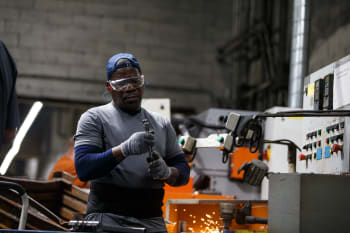The Importance of Skilled Trades Jobs

In an evolving global economy increasingly dominated by technology, a different kind of profession retains its steadfast importance: skilled trades. These jobs, typically manual or technical, require specialised skills, training, or experiences. Below is a more in-depth look at what skilled trades include, why these types of jobs are essential, and how you can get started in a skilled trade.
What Are Skilled Trades Jobs?
Skilled trades jobs encompass a broad range of fields, from construction and mechanics to electrical work and plumbing. These careers often necessitate hands-on, practical skills, and typically require specialised training. For instance, a skilled carpenter would need to understand various wood types, tool usage, and design principles.
Here are some skilled trades examples:
- Electrician
- Plumber
- Welder
- Bricklayer
- Carpenter
- Automotive technician
- Heating, Ventilation, and Air Conditioning (HVAC) technician
- Sewing machine operator
- House painter
- Landscape gardener
- Aircraft maintenance technician
The Importance of Skilled Trades Jobs
Skilled trades jobs are essential for a functioning society, ensuring our homes, businesses, and public spaces are safe, functional, and well-maintained. They also drive the production of goods and promote community development. These careers not only keep the wheels of our communities turning, but also lay a roadmap for a better tomorrow.
Moreover, these jobs are crucial in bridging socio-economic gaps. They often offer competitive pay, and they generally don’t require a university degree, providing a practical pathway to economic security for those who may not have the resources for higher education.
Skilled Trade Jobs in Demand
Despite the increasing push towards digital and tech-centric professions, the demand for skilled trades remains high. According to a global report by the Manpower Group, “globally, nearly 4 in 5 employers report difficulty finding the skilled talent they need in 2023,” with some of the most in-demand jobs being found in sectors such as: energy and utilities; consumer goods and services; industrials and materials; and transport, logistics, and automotive.
This increased demand is due to several reasons. A major factor is the ageing workforce in many skilled trade areas, leading to a growing talent gap. Furthermore, as our infrastructure ages, more skilled trades-people will be needed for maintenance, repair and replacement jobs.
While there is a clear demand for skilled trades, there can also be a misconception that skilled trades careers are less rewarding than office-based jobs. This couldn’t be further from the truth. Many skilled tradespeople report high job satisfaction, citing the tangible results of their work, the creative and problem-solving elements involved, and the stability and good pay these jobs often provide. Additionally, these jobs can open up pathways to new opportunities. Workers can gain greater responsibility in their roles over time, and may even go on to start their own businesses.
Getting Started in Skilled Trades
Interested in exploring skilled trades and finding employment in a trade you like? Here are some tips for getting started:
- Research the field: Investigate different trades to find what interests you. Look into job duties, working conditions, training requirements, and potential pay.
- Get the right training: This can be obtained through vocational schools, community colleges, apprenticeships, and more. You can also find your path to employment with our free employment programmes at Generation.
- Gain experience: Consider internships or apprenticeships where you’ll work under a seasoned professional. This hands-on experience is invaluable in the trades.
- Acquire necessary licences or certifications: Most skilled trades require specific certifications or licences. Make sure you understand and meet these requirements.
Skilled trades jobs are essential, in demand, and accessible to those willing to obtain the necessary training. They present a promising career path for job seekers worldwide. As society continues to evolve, so too will the skilled trades, maintaining their relevance and importance in our global economy. Don’t be daunted by misconceptions. The path to a rewarding career in skilled trades might be just the right fit for you.
If you are a job seeker looking for meaningful employment, Generation wants to help! Our free employment programmes offer hands-on work experience in various fields, online and offline, in 17 countries around the world.
Through our programmes, adults of all ages — whether unemployed, underemployed, or needing to learn new skills — can access training, support, and a path to meaningful employment. We are here to help you succeed! Developing skills through employment programmes like ours can help you become more competitive in the job market and can help you increase your earning potential. And then we connect you with employers who are hiring for the exact roles you’ve been trained to do.
At Generation, our mission is to train, support, and place people into otherwise inaccessible career opportunities that can change their lives. Explore our employment programmes to see how we can help you or donate today to help us create career opportunities for our learners!